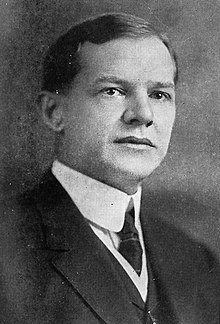Charles R. Crisp
Charles Robert Crisp (born October 19, 1870 in Ellaville , Schley County , Georgia , † February 7, 1937 in Americus , Georgia) was an American politician . Between 1896 and 1897 and again from 1913 to 1932 he represented the state of Georgia in the US House of Representatives .
Career
Charles Crisp was the son of Congressman Charles Frederick Crisp . He attended the public schools in the city of Americus and then was employed by the Department of the Interior in Washington, DC between 1889 and 1891 . Between 1891 and 1895 he was a Parliamentarian with the US House of Representatives responsible for compliance with the rules of procedure. After studying law and being admitted to the bar in 1895, he began working in his new profession in Americus. Politically, he was a member of the Democratic Party .
After the death of his father, who had also acted as Speaker of the House of Representatives from 1891 to 1895 , Crisp was elected as its successor to the US House of Representatives in Washington at the due by-election for the third seat of Georgia, where he was elected on December 19, 1896 took up his new mandate. Since he did not run in the regular congressional elections of 1896 , he was only able to end the current legislative period in Congress until March 3, 1897. He then worked again as a lawyer in Americus. Between 1900 and 1912 he worked as a judge in this place. Between 1911 and 1913 he was once again Parliamentarian of Congress; he held the same function at the 1912 Democratic National Convention in Baltimore .
In the elections of 1912 Crisp was re -elected to the US House of Representatives in the third constituency of Georgia, where he succeeded Dudley Mays Hughes on March 4, 1913 . After nine re-elections, he could remain in Congress until his resignation on October 7, 1932. During this time the First World War and the adoption of the 16th , 17th , 18th and 19th amendments to the Constitution fell . His last years in Congress were shaped by the events of the Great Depression in the early 1930s.
Between October and December 1932, Crisp was a member of the Federal Customs Commission. In 1932 he ran unsuccessfully in a by-election for the US Senate . Then Crisp was a member of the commission that dealt with the debt settlement of the costs of the First World War. Otherwise he worked as a lawyer in the federal capital Washington until his death. He died on February 7, 1937 in Americus and was buried there.
Web links
- Charles R. Crisp in the Biographical Directory of the United States Congress (English)
- Charles R. Crisp in the database of Find a Grave (English)
| personal data | |
|---|---|
| SURNAME | Crisp, Charles R. |
| ALTERNATIVE NAMES | Crisp, Charles Robert (full name) |
| BRIEF DESCRIPTION | American politician |
| DATE OF BIRTH | October 19, 1870 |
| PLACE OF BIRTH | Ellaville , Georgia |
| DATE OF DEATH | February 7, 1937 |
| Place of death | Americus , Georgia |


